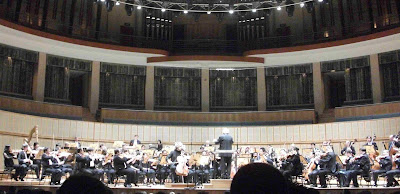WALTON’S CELLO CONCERTO
Esplanade Concert Hall
Saturday (17 November 2012 )
It is always good to hear music that is rarely performed in concert, and this evening’s offerings provided that in abundance. Top on the list was the
Celebrated British cellist Steven Isserlis, sporting a Rattlesque greying afro and playing with gut-strings on his 1726 Stradivarius, brought out a mellow and singing tone in its reticent and restrained opening. The orchestra, ever sensitive to nuance and phrasing, matched him for every move, and the bittersweet first movement breathed a long and impassioned sigh.
Those expecting fireworks got them in the
scherzo-like second movement, which like in the violin and viola concertos, was
a mercurial study in biting sarcasm. Where its menacing undertones were
smoothed over by fiendishly virtuosic playing, Isserlis rode its thorny
challenges and tread a dizzying tightrope in its high registers with commanding
aplomb.
The finale surrenders some clues as to why this work is not often heard. Its greater level of dissonance, difficult improvisatory solos divorced from orchestral manoeuvres, and a subdued (read unspectacular) close militate against “hit” status. However Isserlis’s persuasive manner, wholly convinced of its greatness, won over this audience. Their vociferous applause with multiple curtain calls was rewarded with two lovely encores.
The concert opened with Berlioz’s Queen Mab Scherzo from his dramatic symphony Romeo And Juliet. Under the direction of world-renowned Berlioz specialist John Nelson, the orchestra revelled in a quiet and subtle pianissimo through its entire duration. The ensemble sounded totally refined, a silky evenness of strings interjected with woodwind solos and cameos by two harps and a French horn quartet. The sheer fleet-footedness impressed.
The choice to close with Dvorak’s Sixth Symphony, another rarity, was an inspired one. This listener has had enough of the Eighth and Ninth Symphonies, and this work of Brahmsian expansiveness and richness was balm for the jaded. The first movement moved with its sunny melody and broad sweeping strokes, while the slow movement’s edifice built up organically from a simple three-note motif, first heard on the oboe.
The rustic rambunctiousness of the third
movement’s furiant (a fast and
furious Slavonic dance) was celebratory, and further folk material fuelled the
finale’s spirited resolution. Conducting without a baton, Nelson coaxed a
finely detailed performance that did not miss out on its big embracing
gestures. This is music with a heart, and the rousing reading wore that fact proudly
on its sleeve.
 |
| At the post concert chat, John Nelson explained why he does not conduct with a baton, while Steven Isserlis mused on his love of gut-strings. "In Gut We Trust", he proudly proclaimed! |
N.B. Steven Isserlis's two solo encores was Georgian composer Sulkhan Tsintsadze's Chonguri and Pablo Casals's arrangement of the Catalan melody Song of the Birds.





No comments:
Post a Comment